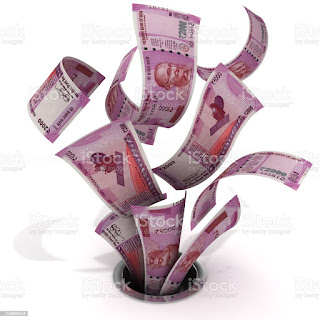The amount of capitalization should be related to the earning capacity of the company.There are 3possible situations of the Capitalization:
i)Fair or Normal Capitalization- It means the business has employed correct amount of Capital and its earnings are same as the average rate of earnings of the company.
ii) Over Capitalization- It means business has employed more capital then required and its earnings are less than the average rate of earnings of the company.
III)Under Capitalization- It means that the business has employed less Capital and its earnings are more than the average rate of earning of the company.
Causes of Over Capitalization....
i) Acquisition of assets at higher prices -Assets might have been acquired at higher prices or at time of their shortage.In both the cases ,the relevant of the company would be low and the earnings become very low.
ii) Higher promotional Expenses/Floatation Cost - The company might incur heavy preliminary expenses such as purchase of Goodwill, underwriting commission,printing of prospectus, brokerage etc.
iii) Under utilization - Sometimes the company may overestimate it's earnings and raise the capital accordingly and if the company is not in a position to invest these funds profitably then in that case the company will have more capital then is required.Consequently , earning per share will be less.
iv) Insufficient Provision for Depreciation -Depreciation may be charged at lower rates and the company may not make sufficient provisions for replacement of assets.This will reduce the earning capacity of the company.
v) Liberal Dividend Policy-The company may follow a liberal dividend policy and may not retain sufficient funds for self financing.This may results in over Capitalization.
vii) Inefficient Management - It also leads to over Capitalization because of wrong decisions and misutilization of resources,hence the earnings of the company will be low.
Effects of Over Capitalization...
I. In Company:
a) Reduced earning per share will there and the shares of the company may not be easily marketable.
b) The company will not be able to raise fresh capital.
c). Reduced earnings may force the company to follow unfair practices.
d) Management may cut down expenditures on maintenance and quality products.
e) Because of low earnings reputation of the company will be lower.
II On shareholders..
a) Shareholders will be get lesser dividend.
b) Market value of shares will go down because of lower profitability.
c) Uncertainty of income to the shareholders.
d) The reputation of the company will go down and because of this share of the company may not be easily marketable.
e) The face value of the equity shares might be brought down.
III. On Society..
a) Return on Capital employed is very low.It means that financial resources of the public are not being properly utilized.
b) An over capitalized company will not be able to pay the interest to the creditors.
c) The workers of an overcapitalised company will not be satisfied as they won't be able to get proper working conditions and wages because the firm is not able to face such situations.
How to overcome the situation of over Capitalization..
i) The earning capacity of the company should be increased by increasing the efficiency of workers and machinery.
ii) Conservative dividend policy should be followed.
iii) Those funds which carries higher rate of interest may be redeemed out.
Causes of Under Capitalization:
i) Acquisition of assets at the time of recession period-Assets might have been acquired at low costs and higher income can be earned by their use.
ii) Underestimation of Requirement - Sometimes, the capital requirements of a company may be under estimated.
iii) Conservative dividend policy -The company may follow Conservative dividend policy and can increase their earning capacity.
iv) Efficient Management - Due to the efficient management,the company may need the financial requirement at lower rates of interest and can increase their earning capacity.
Effects of Under Capitalization..
1) On shareholders:The profitability of the company may be very high.As a result, the rate of earnings per share will be go up.
2) Reputation of company will be increase.
3) The shareholders can expect high rate of dividend.
II) On company
1) Higher rate of earnings creates more competition.
2) The Government may increase tax rates.
3) More secret reserves.
4) The workers can expect high wages ,bonus etc.
III) On Society:
1) Unhealthy speculation.
2) consumers may feel exploited and they think higher profits with higher prices.
3) Adverse effect on the Goodwill of the company.
Steps to be taken in under Capitalization situation..
1) Management can issue bonus shares to the shareholders.This will reduce the rate of earning per share.
2) By increasing the par value of equity shares.This will lead to increase the rate of earning.
Difference between Over Capitalization and Under Capitalization..
1) Meaning - Over Capitalization - Capitalization is higher than the existing profits .
Under Capitalization - Capitalization is lower than the existing profits.
2) Utilization of Capital - In Over Capitalization there is surplus capital.
Under Capitalization - Proper Utilization of capital.
3) Regular Income - In Over Capitalization shareholders can not expect regular dividend.
In under Capitalization - Regular Income of the shareholders is assured.
4) Market Price of shares - In Over Capitalization market price of shares is less.
In under Capitalization market price of shares is high.
.






No comments:
Post a Comment
If u have any doubt ,let me know 😊